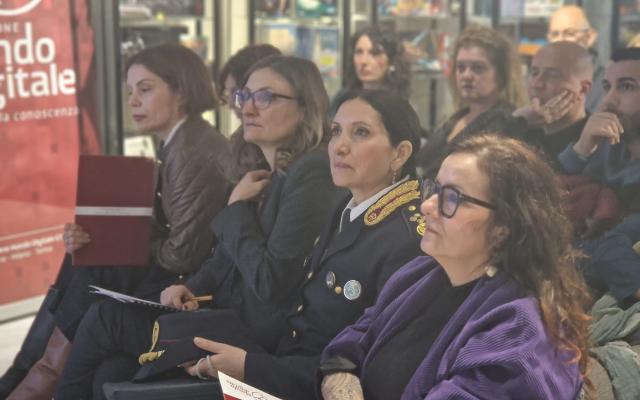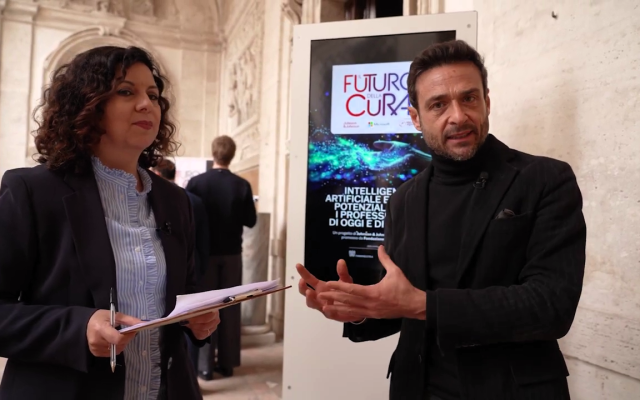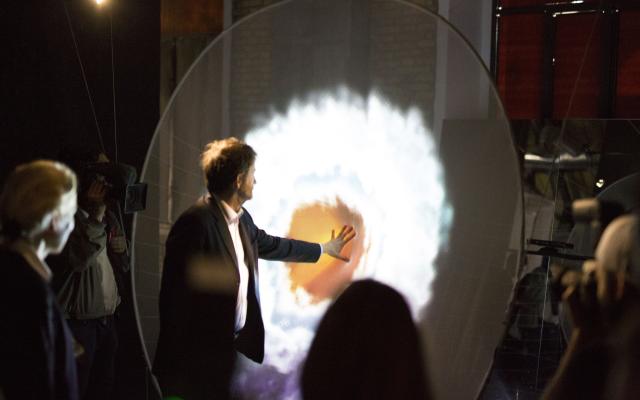With Fattore J at the Johnson & Johnson plant in Latina
In the Fattore J project, carried out with Johnson & Johnson, students and teachers explore topics related to health, innovation and scientific research through hands-on experiences. One of the most significant stages was on 27 February at the Johnson & Johnson plant in Latina, as part of the “From the laboratory to life” initiative [see the news item Students discover pharmaceutical innovation].
A few months later, we return to that day to better understand the mark it left: a moment of orientation and discovery that continues to inspire both those who work every day in the health sector and those who, at school, are beginning to imagine their future.
We have collected two complementary testimonials: the voice of the manager who opened the doors of the company and that of a teacher who accompanied the students, together with their direct comments.
‘This is the first year we have participated in Fattore J,’ says Veronica Cuomo, professor of organic chemistry and biochemistry at the Galilei-Sani high school in Latina. "We can say that this project completes and closes a circle, bringing young people closer to the world of technical-scientific training and health. We collaborate with organisations in the health and research fields, we have talked about blood donation and balanced nutrition, and we collaborate with manufacturing companies through cross-curricular skills and guidance programmes. In our school, health-related issues are at the centre of a very frank dialogue, and we also talk about chronic or serious diseases with a scientific but empathetic approach. We all know or have family members with serious illnesses and feel the need to learn more. This school year, for example, we have been involved in a project with the Faculty of Pharmacy and Medicine at La Sapienza University in Latina on anti-cancer drugs."
For the teacher, Factor J is therefore a project that fits in well with the path she has taken with her students. 'What struck me most was the ethical approach of the initiative, putting the patient, or rather the person, at the centre of the process. Not only that, but we also had the opportunity to understand the processes and pathways related to the drug, appreciating the uncommon attention to thehuman side of care. For future initiatives, we would love to get involved in the production process!‘
Furthermore, talking to professionals in the pharmaceutical sector was both an interesting career guidance opportunity for the students and a glimpse into what it means to work in a competitive environment: ’There are many women at the top of J&J, and we would really like to see the same situation in other companies in our country. There was talk of recruiting new talent, which is also really inspiring for 17-year-olds who are about to make important choices for their future.‘ An immersion in an inclusive present, a glimpse of a possible future: ’For me, having worked in the sector, it was no surprise. I had prepared the students to expect a very advanced, highly professional environment that is very attentive to people. But seeing it first-hand was different for them, emotionally engaging,‘ concludes Veronica Cuomo.
More than 30 girls and boys from the fourth year classes took part in the day. After two years of common study for all courses, the school offers its students many different specialisations, including ’Chemistry, Materials and Biotechnology", where they study chemical-biological instrumental analysis and production processes. This course is certainly in line with the vocation of the area in which the school is located, where commercial, industrial and service businesses flourish. "During the meeting I attended at the J&J plant, thanks to the testimonials I heard, I realised even more how important technology and innovation applied to medicine are for health. In fact, thanks to the virtual tour, I saw how the production of a large pharmaceutical company is entrusted to fully robotised lines, but also how the professionalism and skills of the staff who work there make the difference in producing a drug that meets the highest standards and is at the service of the patient," says Lorenzo.
"I believe that technology and innovation are very important for health for two reasons: the first is related to pharmaceutical research, i.e. the production and research of increasingly effective drugs, while the second reason concerns the technology that can be exploited to produce drugs in ever shorter times. After the meeting at the J&J plant, I realised how this company is already looking to the future and how attentive it is to patients, who are at the centre of everything it does," explains Francesco.
Antonio Ricci is QC Manager at Johnson & Johnson Innovative Medicine Italia. "In presenting who we are and what Johnson & Johnson does, we decided to use the “life model”: involving students in the production process with an interactive approach, putting them in contact with our experts. On the one hand, our colleagues illustrated the production of drugs, and on the other, we gave space to interactive sketches, question and answer sessions, and demonstrations of concrete experiments. For example, we showed how a tablet is made from magic sand using a punch. We also devoted a lot of time to the “cultural” component, talking about the skills that are important for our work, the talents we are looking for, and the research aspect. Throughout the morning, there were also many opportunities to talk about the J&J values that guide our work every day, starting with our focus on our patients. The students were enthusiastic and gave positive feedback on all the opportunities for direct interaction, answering the questions in a sort of final “test” correctly, thus demonstrating their attention and participation. At the end of the morning, we had lunch together and continued the discussion," says Ricci.
How do you build a career in the healthcare sector? ‘It is important to balance the skills acquired during your studies with transferable skills. Personally, I believe it is essential to value soft skills and your own interests: I am passionate about artificial intelligence and technology, and I am also interested in finance, which has helped me a lot in my work,’ replies Antonio Ricci. "Soft skills are also important for working life. One example is public speaking. That's why we asked the students to share their career and life aspirations with the audience. Talent must be developed in all areas with a view to the future. Talking about my own career path, I introduced the opportunity to join J&J through the three-year Gold programme. This programme allows talented young people to work in different sectors of the group and at various J&J sites around the world. This initiative is dedicated to young people who have specific requirements, including language skills, and is particularly aimed at engineering, chemistry and data analysis profiles."
Finally, Antonio Ricci also told us about his professional career: "Today, I am Quality Control Manager and am responsible for two laboratories and a group that drives technological innovation. This year, I also have the opportunity to be the site's Cultural Champion and coordinate cultural events at the Latina site, working in particular with representatives from each department involved in the various events. This group of people is the “Cultural Team” and consists of more than 100 people who are called upon from time to time. My background includes a degree in chemistry from the University of Bari, followed by work in Research & Development abroad, before joining the J&J laboratories. In my career, for example, my training in statistics and instrumental analytical chemistry has been fundamental. I joined J&J as a laboratory technician and, during my career, I have held positions of increasing responsibility, culminating in the position of Quality Control Manager. In each of my career stages, I have gained skills in Good Manufacturing Practices, people management and leadership, finance as well as technical aspects, digitalisation and technological evolution in drug production."



